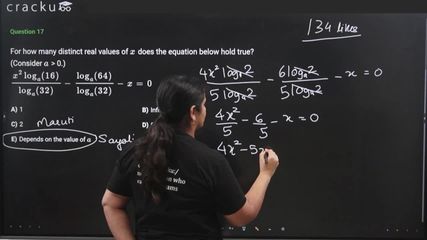For how many distinct real values of $$x$$ does the equation below hold true? (Consider $$a$$ > 0.)
$$\dfrac{x^2 \log_a(16)}{\log_a(32)} - \dfrac{\log_a(64)}{\log_a(32)} - x = 0 $$
Solution
In the given equation $$\dfrac{x^2 \log_a(16)}{\log_a(32)} - \dfrac{\log_a(64)}{\log_a(32)} - x = 0 $$
We know the property of log that $$\dfrac{\log_ab}{\log_ac}=\log_cb$$
So, $$\frac{\log_a16}{\log_a32}=\log_{32}16=\log_{2^5}2^4=\frac{4}{5}$$
Similarly, $$\frac{\log_a64}{\log_a32}=\log_{32}64=\log_{2^5}2^6=\frac{6}{5}$$
Hence, the equation can be written as
$$\frac{4}{5}x^2-\frac{6}{5}-x=0$$
or, $$4x^2-6-5x=0$$
Evaluating the discriminant we get
$$D=b^2-4ac=\left(-5\right)^2-4\left(4\right)\left(-6\right)$$
or, $$D=121>0$$
Hence, the equation has two distinct real roots.
But as the question mentions $$a>0$$, so it can take the value $$a=1$$, for which the log term will not be defined, hence there will be no defined solution.
Hence, the answer is Depends on the value of $$a$$
Video Solution

Click on the Email ☝️ to Watch the Video Solution
Create a FREE account and get:
- All Quant Formulas and shortcuts PDF
- 15 XAT previous papers with solutions PDF
- XAT Trial Classes for FREE
